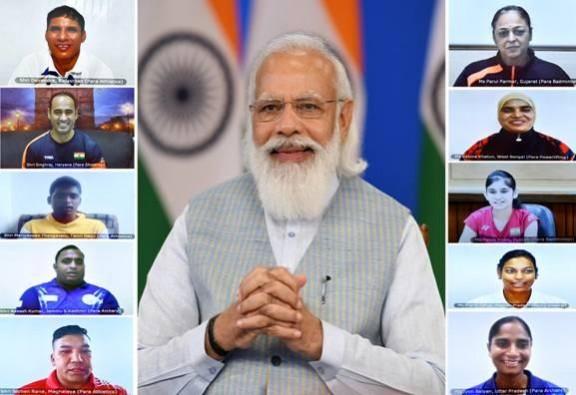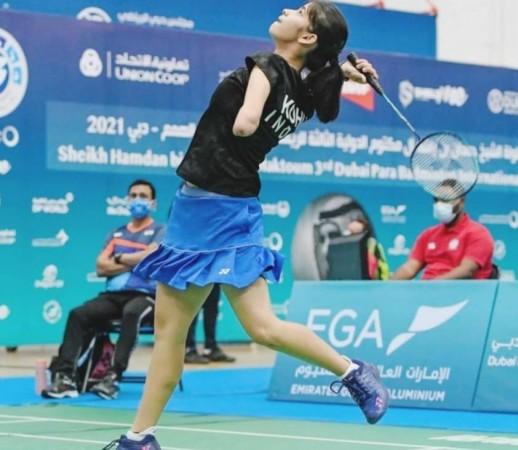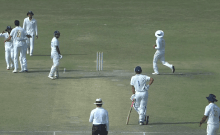While their victory is always made out to be glamourous and pompous, the real-life struggles and failures of being an athlete are seldom spoken about. However, on Tuesday, August 17, while connecting with India's para-athletes in a virtual conference, prime minister Narendra Modi remarked that "they are all winners and role models" for winning over their physical disability and standing up for the name with their super abilities.
Starting August 24, 54 athletes from India with special abilities will represent the country at the 2020 Tokyo Paralympics in nine sports. This is big considering the fact that in the 2016 Paralympics, India had only 19 representatives.

Palak Kohli, one of the youngest members of the contingent is an ace badminton player and spoke to the prime minister with much grace and charm which pressed him to remark and ask, how she was so full of inspiration at such a young age. He furthered with another observation and a smile, "I can notice even today, you are so happy-go-lucky and there is no trace of stress on your face."
Palak who was born with a deformed left arm at birth took to professional badminton in 2017; and since then, has made her family, coach, and the country proud with several national and international championships.

Apart from Palak, the PM also interacted with Parul Parmar (badminton), Mariyappan Thangavelu (high jump), Prachi Yadav (canoeing), Sakina Khatoon (power lift), Singhraj (shooting), Soman Rana (shot put), Jyoti Balyan (archery), Rakesh Kumar (archery), and Devendra Jhajharia (javelin).
He also made time to speak to the para-athletes' family members, coaches and guardians.
40-year-old Devendra Jhajaria, got his left hand amputated after touching an electric wire at the age of 8. Fifteen years later, he went on to win his first gold in the javelin throw at the 2004 Summer Paralympics in Athens. Present with him, at the virtual meet, was his wife Manju, former national level kabbadi player, brother Arvind and daughter Jiya.
On a lighter note, the PM asked his wife if, as a fellow athlete, she had to push and motivate her two-time gold medallist husband every time to go take a win at the championship, to which she replied that he is always 100 percent dedicated to his sport.
This year India is sending nine para javelin throwers to the Tokyo Paralympics; a sport that has gotten much attention after Neeraj Chopra's gold at the Olympics. The other sports categories include archery, athletics (including javelin), shooting, table tennis, para canoeing, swimming, powerlifting, badminton and taekwondo; with the last two being a first for India.
Aruna Singh Tanwar, India's only para-taekwondo athlete at the Tokyo games was missing from the meeting.
21-year-old Aruna who bagged gold and silver in international para-taekwondo championships in 2018 and bronze in 2019, was born with deformed hands, and took to playing taekwondo at the age of 8. Hailing from a humble family in Haryana, she qualified for the Tokyo games through a bi-partite quota.
Also missing from the event were the two para-swimmers Suyash Jadhav and Niranjan Mukund, table tennis duo Sonalben Madhubhai Patel and Bhavina Hasmukhbhai Patel and any representation from para-shooters.
"Earlier, giving facilities to divyang jan (specially-abled persons) was considered as welfare, today the country is working for this as part of its responsibility," the PM noted during the event while speaking about India's Sugamya Bharat Abhiyan (Accessible India Campaign) to serve the differently-able community of the country.
Speaking of finding more such talent from remote corners of the country, he noted, "Our villages and remote areas are full of talent and the contingent of para-athletes is a living example of that. Today the country is trying to reach the players, special attention is being paid to the rural areas."
"To recognize local talent, the number of Khelo India Centers will be taken to 1000 from current 360. We have to keep on improving our ways and system to develop a sports culture in India, shed fears of earlier generations," he concluded.














